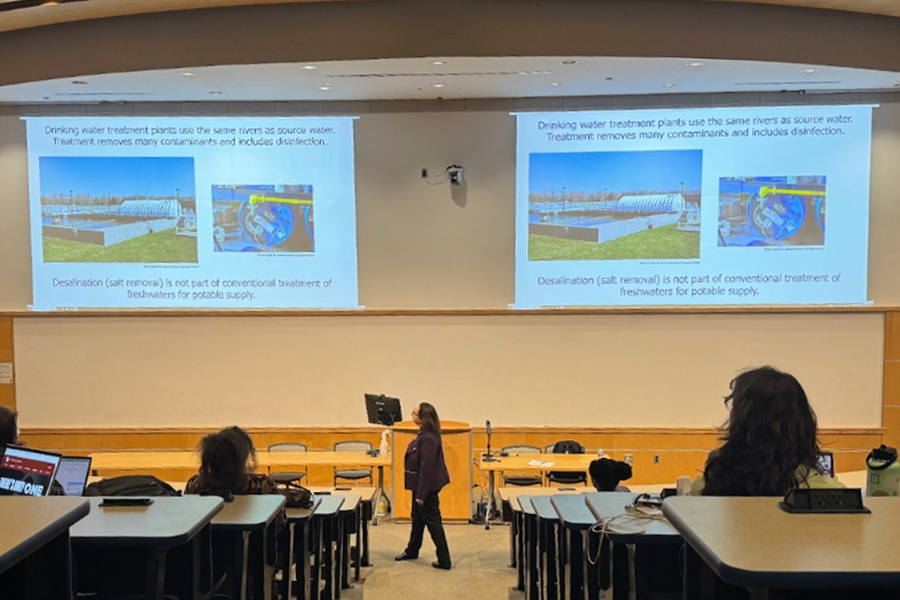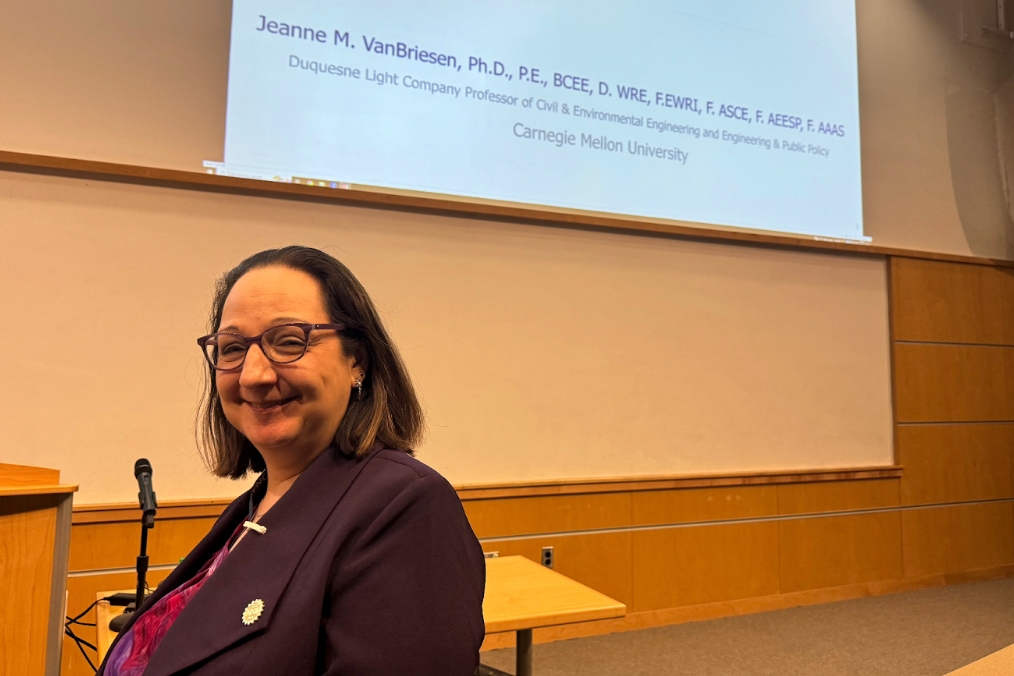
NORMAN, OK – The Institute for Resilient Environmental and Energy Systems hosted Jeanne VanBriesen and Karl Rockne from the National Science Foundation’s Division of Chemical, Bioengineering, Environmental and Transport Systems from Jan. 29-31, 2024.
During their visit, VanBriesen and Rockne held round table meet and greets at Sarkeys Energy Center, group discussions with faculty and students at Gallogly Hall, one-on-one meetings and open office hours – reaching more than 200 faculty and students. They also visited with IREES collaborators at the University of Science and Arts of Oklahoma and the Office of Vice President for Research and Partnerships. The scholars jointly presented potential funding opportunities, the future of sustainability science and opportunities to directly engage with scholars and federal employees.
VanBriesen presented “Navigating NSF: Opportunities for environmental engineering, sustainability science, and convergence research” at the National Weather Center, elaborating on the NSF’s mission and available convergent research opportunities. During the talk, she stated that the outlook for the NSF in 2024 includes advancing emerging industries, building a resilient planet, creating opportunities everywhere and strengthening research infrastructure.

Switching to her personal research, VanBriesen also presented “Effects of Wastewater from Energy Extraction and Utilization on Drinking Water Sources and Risk,” examining the unexpected role of bromide in drinking water in Southwestern Pennsylvania. She explained that fossil fuel extraction and utilization and coal-fired plants eject wastewater with bromide, a common disinfectant known to cause cancer, miscarriage and low birth rate. This research has influenced the ways stakeholders and bodies of governance view the impacts of dirty energy and pollutants.
Rockne presented “Evolving Engineering Education (E3) for the 21st Century,” emphasizing the need for engineers to tackle pressing societal challenges by finding sustainable solutions for environmental issues. He also discussed the National Academy of Engineering’s consensus studies for New Directions for Chemical Engineering and Environmental Engineering for the 21st Century: Addressing Grand Challenges, advocating for clear translations of innovations in academia and including higher education institutions in business platforms to create more opportunities to expand the global market. Using these studies, he advocated for more bright-minded individuals to pursue engineering in response to the new challenges that affect people, profits and the planet.
By bringing successful scholars and current leaders in the field to the University of Oklahoma, IREES aims to cultivate a transdisciplinary and convergent research community concerned with resilient environmental and energy systems. VanBriesen advocates that sustainability scientists should be “studying the world and ourselves.” IREES strives to serve both Oklahoma and the Nation to contribute to that mission.
About this project
Rockne is a program director for CBET in the Engineering Directorate and previously served as the Associate Dean of Research in the College of Engineering at the University of Illinois at Chicago. He was awarded the NSF Director’s Award, the most prestigious award at the NSF, and the NSF CAREER award for research on “active capping” technology for environmental cleanup. VanBriesen is the Division Director for CBET in the Engineering Directorate and a Duquesne Light Company Professor at the Department for Civil and Environmental Engineering at Carnegie Mellon University. The National Science Foundation offers a wide variety of opportunities with flexible research funding. Find more about the CBET program directors and additional funding opportunities.
About the University of Oklahoma
Founded in 1890, the University of Oklahoma is a public research university located in Norman, Oklahoma. As the state’s flagship university, OU serves the educational, cultural, economic and health care needs of the state, region and nation. OU was named the state’s highest-ranking university in U.S. News & World Report’s most recent Best Colleges list. For more information about the university, visit ou.edu.